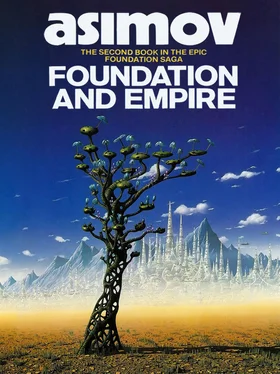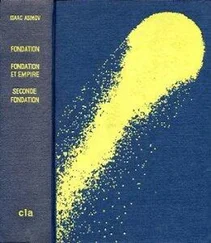“Surely, my lady, it would seem that even yet my body denies the knowledge of my mind and expects of others’ hands a blow.”
“There’s no need for worry, Magnifico. I’m with you, and I won’t let anyone hurt you.”
The clown’s eyes sidled towards her, then drew away quickly. “But they kept me away from you earlier—and from your kind husband—and, on my word, you may laugh, but I was lonely for missing friendship.”
“I wouldn’t laugh at that. I was, too.”
The clown brightened, and he hugged his knees closer. He said, “You have not met this man who will see us?” It was a cautious question.
“No. But he is a famous man. I have seen him in the newscasts and heard quite a good deal of him. I think he’s a good man, Magnifico, who means us no harm.”
“Yes?” The clown stirred uneasily. “That may be, my lady, but he has questioned me before, and his manner is of an abruptness and loudness that bequivers me. He is full of strange words, so that the answers to his questions could not worm out of my throat. Almost, I might believe the romancer who once played on my ignorance with a tale that, at such moments, the heart lodged in the windpipe and prevented speech.”
“But it’s different now. We’re two to his one, and he won’t be able to frighten the both of us, will he?”
“No, my lady.”
A door slammed somewhere, and the roaring of a voice entered the house. Just outside the room, it coagulated into words with a fierce, “Get the Ga-LAX-y out of here!” and two uniformed guards were momentarily visible through the opening door, in quick retreat.
Ebling Mis entered frowning, deposited a carefully wrapped bundle on the floor, and approached to shake Bayta’s hand with careless pressure. Bayta returned it vigorously, man-fashion. Mis did a double-take as he turned to the clown, and favored the girl with a longer look.
He said, “Married?”
“Yes. We went through the legal formalities.”
Mis paused. Then, “Happy about it?”
“So far.”
Mis shrugged, and turned again to Magnifico. He unwrapped the package, “Know what this is, boy?”
Magnifico fairly hurled himself out of his seat and caught the multikeyed instrument. He fingered the myriad knobby contacts and threw a sudden back somersault of joy, to the imminent destruction of the nearby furniture.
He croaked, “A Visi-Sonor—and of a make to distill joy out of a dead man’s heart.” His long fingers caressed softly and slowly, pressing lightly on contacts with a rippling motion, resting momentarily on one key then another—and in the air before them there was a soft glowing rosiness, just inside the range of vision.
Ebling Mis said, “All right, boy, you said you could pound on one of those gadgets, and there’s your chance. You’d better tune it, though. It’s out of a museum.” Then, in an aside to Bayta, “Near as I can make it, no one on the Foundation can make it talk right.”
He leaned closer and said quickly, “The clown won’t talk without you. Will you help?”
She nodded.
“Good!” he said. “His state of fear is almost fixed, and I doubt that his mental strength would stand a psychic probe. If I’m to get anything out of him otherwise, he’s got to feel absolutely at ease. You understand?”
She nodded again.
“This Visi-Sonor is the first step in the process. He says he can play it; and his reaction now makes it pretty certain that it’s one of the great joys of his life. So whether the playing is good or bad, be interested and appreciative. Then exhibit friendliness and confidence in me. Above all, follow my lead in everything.” There was a swift glance at Magnifico, huddled in a corner of the sofa, making rapid adjustments in the interior of the instrument. He was completely absorbed.
Mis said in a conversational tone to Bayta, “Ever hear a Visi-Sonor?”
“Once,” said Bayta, equally casually, “at a concert of rare instruments. I wasn’t impressed.”
“Well, I doubt that you came across good playing. There are very few really good players. It’s not so much that it requires physical co-ordination—a multibank piano requires more, for instance—as a certain type of free-wheeling mentality.” In a lower voice, “That’s why our living skeleton there might be better than we think. More often than not, good players are idiots otherwise. It’s one of those queer setups that makes psychology interesting.”
He added, in a patent effort to manufacture light conversation, “You know how the beblistered thing works? I looked it up for this purpose, and all I’ve made out so far is that its radiations stimulate the optic center of the brain directly, without ever touching the optic nerve. It’s actually the utilization of a sense never met with in ordinary nature. Remarkable, when you come to think of it. What you hear is all right. That’s ordinary. Eardrum, cochlea, all that. But— Shh! He’s ready. Will you kick that switch. It works better in the dark.”
In the darkness, Magnifico was a mere blob, Ebling Mis a heavy-breathing mass. Bayta found herself straining her eyes anxiously, and at first with no effect. There was a thin, reedy quaver in the air, that wavered raggedly up the scale. It hovered, dropped and caught itself, gained in body, and swooped into a booming crash that had the effect of a thunderous split in a veiling curtain.
A little globe of pulsing color grew in rhythmic spurts and burst in midair into formless gouts that swirled high and came down as curving streamers in interlacing patterns. They coalesced into little spheres, no two alike in color—and Bayta began discovering things.
She noticed that closing her eyes made the color pattern all the clearer; that each little movement of color had its own little pattern of sound; that she could not identify the colors; and, lastly, that the globes were not globes but little figures.
Little figures; little shifting flames, that danced and flickered in their myriads; that dropped out of sight and returned from nowhere; that whipped about one another and coalesced then into a new color.
Incongruously, Bayta thought of the little blobs of color that come at night when you close your eyelids till they hurt, and stare patiently. There was the old familiar effect of the marching polka dots of shifting color, of the contracting concentric circles, of the shapeless masses that quiver momentarily. All that, larger, multivaried—and each little dot of color a tiny figure.
They darted at her in pairs, and she lifted her hands with a sudden gasp, but they tumbled and for an instant she was the center of a brilliant snowstorm, while cold light slipped off her shoulders and down her arms in a luminous ski-slide, shooting off her stiff fingers and meeting slowly in a shining midair focus. Beneath it all, the sound of a hundred instruments flowed in liquid streams until she could not tell it from the light.
She wondered if Ebling Mis were seeing the same thing, and if not, what he did see. The wonder passed, and then—
She was watching again. The little figures—were they little figures?—little tiny women with burning hair that turned and bent too quickly for the mind to focus?—seized one another in star-shaped groups that turned—and the music was faint laughter—girls’ laughter that began inside the ear.
The stars drew together, sparked toward one another, grew slowly into structure—and from below, a palace shot upward in rapid evolution. Each brick a tiny color, each color a tiny spark, each spark a stabbing light that shifted patterns and led the eye skyward to twenty jeweled minarets.
A glittering carpet shot out and about, whirling, spinning an insubstantial web that engulfed all space, and from it luminous shoots stabbed upward and branched into trees that sang with a music all their own.
Читать дальше












